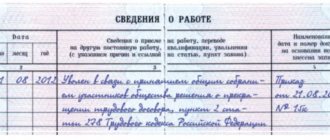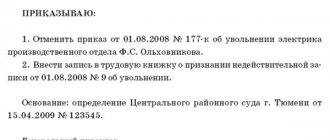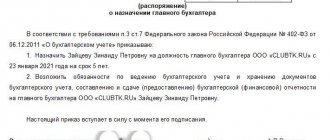The word “director” is of Latin origin, but came to Russian from Romano-Germanic (Western European) languages, in which it fully retained its original meaning - leader, organizer or directing subject (person or thing, see below).
"Director" in the plural is correctly spelled depending on whether it is an animate or inanimate object:
- If the director is a manager, a chief, then the plural will be “directors”.
- If the director is something inanimate (a director, a guiding element or a system), then if several such directors are meant, you need to write “directors” . The case forms change accordingly, also see below.
What does the law say about the difference between a CEO and a director?
The phrase “general director” began to be used in the titles of the position of manager of the civil service of the Soviet Union in the post-war years and denoted the highest management rank, presiding over a network of institutions located within the same department.
Now we can find the interpretation of this term in the Modern Economic Dictionary, which interprets it as the position of the head of a multidisciplinary organization, the structure of which implies the existence of many departments. The heads of departments of the enterprise in this case are his deputies, directors or managers of various areas of activity.
The law does not contain clear instructions on the title of the position of the sole executive body (hereinafter referred to as the sole executive body) of a legal entity, which is the head of the organization. But at the same time, in the regulations regulating the activities of companies with different organizational and legal forms, there are references to possible titles of the position of the head of the company.
So, in paragraph 1 of Art. 40 of the Law “On LLC” dated 02/08/1998 No. 14-FZ, among the possible titles of the position of a person with the powers of an individual sole executive officer, “General Director” and “President” are mentioned. At the same time, there is no rule in the law that excludes other names.
Clause 1 Art. 69 of the Law “On JSC” dated December 26, 1995 No. 208-FZ tells us that the management of a company can be carried out by a director or general director. There is no rule prohibiting the use of other names in this legal regulation.
Find out how to appoint a director of an LLC in ConsultantPlus. Get trial access to the K+ system and upgrade to the Ready Solution for free.
What is the difference?
So, what is the difference between a CEO and a director? You should not look for a fundamental difference in the names of these positions from a legal point of view. The practical use of concepts is important here.
First of all, the formation of the name of each position is influenced by the organization’s field of activity: business or non-profit activity. Most often it happens like this:
- the main figure in the structure of a commercial organization is the general director;
- a leading position in a non-profit organization is simply director;
- functional manager in a commercial company - director (economics, personnel, public relations, financial, and so on);
- the same functions in a non-profit organization are assigned to the deputy director.
What is the difference between a general director and a director in a structure, for example, an LLC? Here everything is built according to a slightly different principle. Every limited liability company usually has a board. Each member is called a director, and the board as a whole is called the Board of Directors. Among them, one chief is selected or appointed - the general director of the LLC. It is he who carries out the main strategic management, based on the opinions and wishes of the Board of Directors.
What is the difference between a director and a general director in practice?
When creating a new organization, it is necessary first of all to decide on the proposed structure of the company, based on the type of its main activity. If you plan to coordinate the work of departments, including separate ones, with a large number of personnel, then it is most logical to leave the position of general director or president for the head of the company, and for department managers - the positions of directors or managers (for example, development director, financial director, division manager) .
If a small company is created with a small number of employees, where often the functions of departments of large corporations are performed by one employee, then the position of “director” will be sufficient for the manager.
It is also worth considering the following features: according to established practice, when drawing up contracts and documents with counterparties, lawyers and accountants indicate the position of general director for the signatory. If you decide to use a different job title, then the contracting officer will have to constantly emphasize this fact and possibly redo contracts just because of an error in the signatory's job title.
Read about how a CEO can resign at his own request here.
Responsibilities
The responsibilities of a director typically include:
- organization and effective operation of all structural divisions;
- increasing the profitability of the company;
- approval of the staffing table;
- establishing bonuses and allowances for employees;
- ensuring fulfillment of obligations to suppliers, creditors and customers;
- delegation of control of certain areas of activity to heads of divisions and branches;
- control over the operation of the enterprise structure;
- ensuring compliance with the regime of saving financial and labor resources.
The director's responsibilities also include:
- drawing up a master plan for the enterprise’s production and its development;
- development of the organization’s budget for the year, quarter;
- monitoring the accounting of expenditures and receipts of funds, use of materials;
- monitoring compliance with financial discipline;
- compliance with timely submission of reports to the relevant authorities.
What is the difference between an executive director and a general director?
One of the persons subordinate to the general director may be not only the financial director or production director, but also the executive director. The difference between these two positions is that only the general director has the right to sign documents without a power of attorney and performs the function of sole executive officer in accordance with the Civil Code of the Russian Federation.
But the range of responsibilities, in accordance with the job description, may consist of both the division of controlled areas of activity and the duplication (replacement) of functions. It is necessary to understand that the executive director will have the right to sign documents relating to business activities only if there is a power of attorney, a copy of which must be provided to counterparties when concluding contracts.
Read the rules for registering part-time jobs in the material “How to properly register an external part-time job?”
Grammar
The word “director” is a masculine noun of the 2nd declension. Consists of the root “direct-” and the suffix “-or”. Placement of stress and separation by hyphens di-rek-tor . Declined in different ways depending on whether they belong to animate or inanimate objects:
- Nominative: director (singular); directors (plural, animate), directors (plural, inanimate).
- Genitive: directors (singular); directors (plural, animate) directors (plural, inanimate).
- Dative: director (singular); directors (plural, animate), directors (plural, inanimate).
- Accusative: directors (singular, animate), director (singular, inanimate); directors (plural, animate), directors (plural, inanimate).
- Creative: director (singular); directors (plural, animate), directors (plural, inanimate).
- Prepositional: director (singular); directors (plural, animate), directors (plural, inanimate).
Description of the director's position
A director is an employee of a company who is part of the management team of the enterprise and who performs the functions assigned to him. The director of a small enterprise can be an individual sole executive officer, but in large companies, this position is given to hired employees. To understand what functions a director performs, let's look at the competitive example of a marketing director. The Marketing Director is responsible for advertising the company and developing the company through the brand. His terms of reference include:
- hiring employees for the marketing department;
- searching for advertisers and concluding contracts with them;
- development of the company's advertising concept;
- development of a personal brand for the company;
- stimulating sales growth, etc.
The director performs his duties through the work of his staff. The director determines the work plan, and department employees execute it.
Director as a profession.
Every ordinary employee of any enterprise probably dreams of becoming a director. Significance, power, increased salary, and some other privileges always accompany this position. But we must not forget about the high responsibility of the manager, both to ordinary employees of his organization, business owners (if the organization is commercial), and to government regulatory authorities. Being a director is a very difficult and nervous job, requiring certain business qualities and complete dedication to your work.
As a rule, in small private companies there is only one director. He exercises general management and control over all work and activities of the enterprise. Along with the expansion of the organization, an increase in the number of employees, and the opening of branches, the director necessarily has an additional amount of work to do. One person can no longer cope with this volume, and other director positions responsible for a certain direction in the company’s work are included in the staff. So there are different directors. Let's name some of the most common director positions:
- CEO. This is usually the most important leader of the company. It is also called the Sole Executive Body of the company (partnership, etc.) in the organization’s Charter and in legal slang.
- Commercial Director. This is, as a rule, the chief assistant to the general director, who is responsible for the commercial component of the organization’s activities and determines the strategy for commercial activities.
- Financial Director. The manager responsible for controlling the organization's cash flows.
- Director of Business Development. He is responsible for the effectiveness of actions aimed at expanding the business.
- Executive Director. This manager is responsible for almost all processes. During the times of the USSR, and even now in government organizations, this position is referred to as deputy director for general issues.
- HR Director As a rule, this manager develops and develops the personnel strategy of the enterprise and carries out personnel management.
Let's take a closer look at the functions and responsibilities of people holding these responsible positions.
CEO.
The general director is the most important leader of the organization, a hired person, but in some cases he can be appointed (elected) from among the founders (shareholders, etc.). All other responsible full-time and freelance employees are subordinate to him. He has the right of first signature on all financial documents, and also acts on the basis of the Charter without a power of attorney on all issues relating to the enterprise. All the most significant and responsible events carried out in the company, personnel changes, financial movements, etc., occur only with his knowledge and on his order. The responsibilities of the CEO typically include the following functions:
- General control of the enterprise's activities.
- Coordination of all structures that make up the enterprise.
- Planning the long-term development of the enterprise and monitoring the implementation of this plan.
- Ensuring timely cash flow for all financial obligations of the enterprise.
- Representing your company at all official events, participating in strategic negotiations regarding its activities.
In some cases, the position of general director can be combined with the position of chief accountant.
As a rule, this happens in small companies where accounting is not very extensive.
Commercial Director.
In different organizations, the areas of activity for which the commercial director is responsible may differ slightly. But at its core, the person holding this position is, of course, one of the key figures in the organization and, almost always, is the right hand of the CEO. This manager can also be called the first deputy general director, but to improve the status of the position, many companies call the “second person” of the company commercial director. The main responsibilities of this manager, as a rule, include:
- Working out all the details of the company's strategic development.
- Organization of sales of the company's products and monitoring the effectiveness of this process.
- Organizing and conducting marketing activities aimed at increasing the conversion of advertising campaigns.
- Close work with suppliers.
- If a company is engaged in any production, then he, together with technologists, is responsible for working out all actions aimed at reducing production costs.
- General control over the logistics of the enterprise - the operation of warehouses, organizing the delivery of goods, receiving components, etc.
During the operation of the enterprise, the commercial director periodically has other responsibilities related to current work issues. Noting the entire volume of tasks assigned to this manager, it is quite logical that only a comprehensively developed person who is well versed in the specifics of the enterprise’s activities is appointed to this position.
Financial director.
It is difficult to overestimate the importance of the work carried out in the organization by the financial director. After all, he controls the movement and distribution of the company’s funds. If an enterprise is compared to the human body, then the finance director is responsible for its circulatory system. The main functions of this manager are as follows:
- Coordinating work with credit and other financial institutions on behalf of your company.
- Control over enterprise investments.
- Analysis of the effectiveness of the financial activities of your enterprise.
- Calculation of the profitability of the organization’s activities and implementation of actions aimed at increasing it.
- Analysis of the economic efficiency of the activities of separate divisions of the organization.
- Takes a leading part in improving the credit policy of the organization.
The manager holding such a position is, as a rule, a person with a higher economic education and sufficient experience in the financial sector. His professionalism often plays a decisive role in certain issues of strategic planning for enterprise development.
Director of Development.
Every business, every production should not stand still. They must develop and move forward, achieving the goals outlined when planning activities. It is the development director who is responsible for actions that involve expanding and strengthening the organization. His responsibilities typically include the following:
- Determination of long-term and intermediate goals of the organization.
- Study and thorough analysis of new directions for the company's development.
- Studying and planning the company’s entry into new markets.
- Adjusting the interaction of enterprise structures to achieve greater efficiency of their activities.
- Organization of various presentations for the top management of the enterprise regarding issues of its development.
Typically, young, ambitious top managers who keep up with the times are appointed to this position.
Executive Director.
It is difficult to overestimate the importance of this manager. Perhaps this position in some cases turns out to be more significant than the same commercial director, because if we simply decipher this position in the company, then in essence it can be called “everyone’s mother” or “everyone’s dad.” And all because the responsibilities include quite a lot of functions:
- together with the development director, determines the company’s strategic development program;
- resolving administrative and economic issues;
- ensuring the free functioning of all divisions of the company;
- exercising general control over the activities of all divisions of the company, with the exception of those controlled personally by the CEO;
- carries out other functions that are established in each company individually.
HR Director
This position became a kind of continuation of the functionality of the HR department.
Modern business processes have led to the fact that in order to successfully conduct business, it is necessary to very correctly build a personnel management structure, as the main driving force of any enterprise.
At first it all started with the modernization of HR departments to personnel management services, etc., but all this “colossus” in large companies, as well as those where they understand the importance of competent human resource management, is led by the HR director.
Here are some of the functions of this manager:
- budgeting;
- work on personnel forecasting and planning;
- formation, use and development of personnel;
- development and implementation of personnel strategy;
- formation and development of corporate culture;
- other directions.
Who writes the job description
The CEO is elected to the position by the founders of the company at a general meeting. They also develop job descriptions and employment contracts. A job description is drawn up not for a person, but for an employee, that is, for a position. It specifies the main responsibilities, rights, and working conditions. After the publication of the employment contract and job description, an order is signed to appoint the General Manager to the position.
In some cases, the job description is developed and approved by one of the directors, whose powers are secured by the decision of the founders. In small companies, the general director has the right to independently approve and develop the provisions of the job description and employment contract.
Registration requirements
There are no special requirements for the design of the job description of the State Duma. The structure of the document directly depends on the list of rights and responsibilities of the employee. A typical job description for a general director includes the following provisions:
- Basic information. The terms used in the instructions are described here.
- The section on the duties of the General Director describes all the functions of the employee. Sometimes the responsibilities clause is combined with the employee rights section.
- The rights of the General Director are highlighted in a separate section or included in the previous paragraph.
- The responsibility of the General Director should be designated in a separate section. It specifies the actions for which the employee will be punished.
Important! Changes to the job description are made by decision of the general meeting of the company’s founders.






